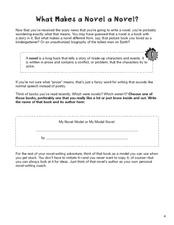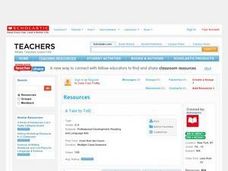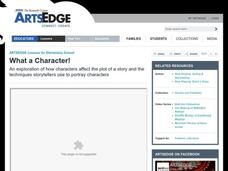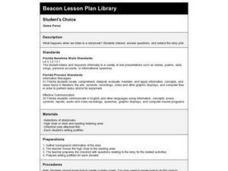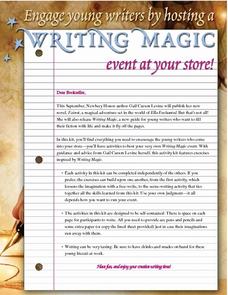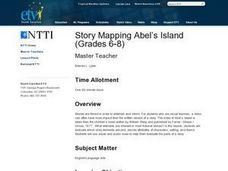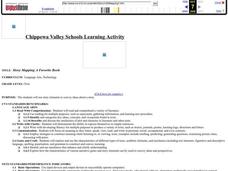Curated OER
Problems and Their Solutions in Stories and Everyday Life
Students identify story elements. In this stories instructional activity, students read a story and identify the chracter, character traits, plot, setting and theme. Groups of students match problem and solution cards.
Curated OER
Reading and Activity Suggestions for The Adventures of Tom Sawyer
Students learn about characterization techniques in The Adventures of Tom Sawyer. In this Adventures of Tom Sawyerlesson, students write a description of one character through the eyes of another character and identify scenes that give...
Curated OER
STORY GRAMMAR
In this story grammar worksheet, students are asked to describe the setting, main characters and events from their book in short-answer form.
Curated OER
Write, Right
This resource provides the beginning ideas for a instructional activity on writing a narrative. Learners watch a video, identify story elements, including plot and setting, and then write their own stories. If augmented, this...
Curated OER
Because of Winn-Dixie Scrapbook
Here is a fun resource that your kids will love. While reading the book Because of Winn-Dixie, they analyze the story's main characters by creating an online scrapbook. The purpose is to have them identify character traits and use...
Curated OER
What Makes a Novel a Novel?
As your authors prepare to write a hypothetical novel, they need all the inspiration they can find! Using a book they have already read (and enjoyed), learners complete a literary analysis by filling in eight short-answer questions....
Scholastic
A Tale to Tell!
A creative spin occurs when one pupil acts as author Ann M. Martin. Using a Q & A at the back of her book A Dog's Life, other classmates ask the "author" questions. They discuss the reasons why they know the book is from a...
Curated OER
Elements of Fiction
A wide variety of information regarding the elements of fiction is presented in this PowerPoint. Viewers are directed to trace their hand on a blank piece of paper and label each finger with one of the 5 elements of fiction. Additional...
Mariely Sanchez
Story Map
What just happened in that story? Kids can track the plot of any story using this worksheet. They fill in the title, author, and illustrator as well as the setting, characters, major plot points, and their own conclusion about the story.
Curated OER
Stone Fox Plot Frame
Fifth graders recall the major plot points of a chapter book. After reading the chapter book "Stone Fox," they students describe the plot framework through use of a worksheet. Students are then divided into group to act out selected...
Curated OER
Set the Scene
Third graders read the story "A Bargain for Frances" and make predictions about the unfolding plot of the story. In this set the scene instructional activity, 3rd graders examine the three parts of a story; the beginning, middle, and end.
Curated OER
Of Mice and Men Plot
For this Of Mice and Men worksheet, high schoolers fill in a plot graphic organizer with details about characters, settings, and events in chapters 1-6 of the Steinbeck novel.
Curated OER
What a Character!
Students look at the role of characters in a story. For this character lesson, students discuss how different types of characters change the plot of the story. They see how storytellers use their body, face, and voice to tell stories.
Curated OER
It's in the Elements - Lesson Four
Young scholars compare and contrast story elements in two versions of Cinderella. In this literature elements instructional activity, students are read two different versions of Cinderella, they identify the characters, plot, and...
Curated OER
What If: The Seed Of A Story
Students read and comprehend a piece of fictional writing, analyze how setting, characterization, and plot affect the theme of a story and work in a group to create a new writing assignment. This 5-day plan culminates in students writing...
Curated OER
Stump the Dump Maze Game
Students complete reading Because of Winn-Dixie individually or as a class. As students reunite Opal and Winn-Dixie in this timed reading comprehension maze game, they demonstrate their understanding of the novel's plot, theme, and...
Curated OER
Read Aloud- Literary Elements- Prediction
First graders read two stories. In this literary elements instructional activity, 1st graders read The Hat by Jan Brett, notice patterns of prediction, identify the setting, problem and solution and compare the story to the book The...
Curated OER
STUDENT'S CHOICE
Students interact, answer questions, and extend the story plot. They write a Haiku or basic poetry with their words, name characters, create a new ending for a story, and write a new story with one of the characters.
Curated OER
Writing Magic
Learners write a story. In this writing lesson plan, students are given a series of prompts to promote them in writing a story. The prompts include writing a free write, writing about characters, writing about a setting, writing about...
Curated OER
Story Mapping Abel's Island
Students are able to prioritize story elements using graphic organizers. They are able to evaluate character, setting and sequence in a non-print source. Students use visual and audio clues to help them evaluate the parts of a story.
Curated OER
Story Elements
Third graders identify story elements. In this story elements lesson, 3rd graders look at main idea, characters, point of view, theme and setting. They create a five paneled comic strip from a book.
Orange County Department of Education
Black Cowboy, Wild Horses
Fifth graders read the selection Black Cowboy, Wild Horses and identify characteristics of self-discipline shown by story's main character, Bob Lemmons. Students then identify some of their own traits of self-discipline and reflect upon...
Curated OER
Story Mapping A Favorite Book
First graders create a diagram of a story by using the computer program Kidspiration. In this diagramming lesson plan, 1st graders will pick a book to write about. They then will plug in story elements of the book into the computer...
Curated OER
Evaluating a Book By Its Cover
Students practice using predictive strategies before reading a book. In this literacy lesson plan, students identify the theme and characters of the novel based on the cover illustrations.







